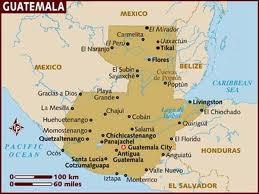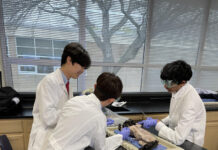As I pondered the hallways of Jesuit College Prep last week, I could not help but be drawn to the bustling clamor of room B216. I poked my head in to find the Jesuit Medical Mission participants packing up industrial sized duffle bags with their recent collection from the school-wide medicine drive. The genial group invited me in and allowed me to take a look around and ask a few questions.
The group is going to the small village of Chacaya, Guatemala, to provide care for the impovrished locals. The native language of the villagers is “Tzutil Mayan,” a dialect of Mayan. Interestingly enough, the people are modern-day Mayans, descendants of the great empire long ago.
The Spanish language, drastically defecting from Tzutil, is not a sufficient language of communication among the villagers. Fortunately for our Jesuit brothers, Dr. Walter Julaju, trilingual in Tzutil, Spanish, and English, will be translating and instructing our Jesuit brothers. He works in the modest four-room clinic in Chacaya – the same one Jesuit will be assisting on their trip.
“We’re looking to help out roughly 800 people this year” said Tim Nguyen ’12, who has also traveled to Nicaragua on a Jesuit mission trip. He went on to tell me about his simple itinerary for the three day mission trip, from March 21-24: “Wake up early, go out to the Chacaya, about thirty minutes away from their hotel in Santiago, help out patients, and return to the hotel at night for a little rest.”
Clearly, aiding up to 800 people requires a great deal of medicine. Due to this, many Jesuit students, myself included, have expressed concern that their donations to the medicine drive will be a temporary fix only. Veteran Medical Mission leader Jan Jones, a biology teacher who is about to embark on her third trip to the village, assuaged my concerns after informing me that the team stresses “working on the full person.”
By this she means that in addition to the 550 pounds of medication provided, the group will also help the villagers outside of the clinic. For example, last year a woman was gravely distressed that she had no chickens. Exemplifying what it means to be men for others, the Jesuit Medical Mission members purchased the woman new chickens, bringing her happiness beyond purly medicinal boundaries.
While a vast amount of medicine will be used, leftovers will be abundanent. The remains will be dispersed to local clinics and be available for use year-round.
We wish the Jesuit Medical Mission well as they head abroad in the coming weeks.






